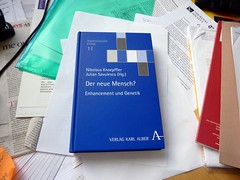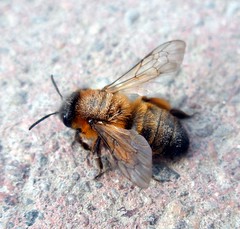February 28, 2010
Out of the closet
 I'm now officially out of the closet... no, not that closet, the other one, about taking cognition enhancer drugs: The Times, February 27, 2010: Bring 'smart drugs' out of the closet, experts urge Government (written by Lucy Bannerman).
I'm now officially out of the closet... no, not that closet, the other one, about taking cognition enhancer drugs: The Times, February 27, 2010: Bring 'smart drugs' out of the closet, experts urge Government (written by Lucy Bannerman).
Overall, the problem set we have today with cognition enhancers seems to be:
- People are using enhancers of all kinds, many that have no effects and are a waste of money, some with measured effects but potentially relevant side effects.
- We do not know that much about their utility in a real world setting, nor the risks of long-term enhancer use.
- There is little research on this because enhancer use is not seen as proper, so there is little funding for it from research councils or pharma companies.
- Pharma companies make money from the drugs regardless of why people take them. They are unwilling to do problematic lobbying to change the status of enhancers, but might (together with the medical profession) medicalize more conditions to make larger and larger groups possible to 'treat'.
- People in general are sceptical against the ethics and social desirability of enhancers when considering them in 'far' mode, but when actually dealing with them in their everyday life ('near' mode) they are much more positive. But as long as there is a stigma in public they will not bring up their experiences.
Basically we have a situation here were we have use of enhancers that can be unnecessarily wasteful or harmful. This is because there is not much consumer information, medical oversight, legal access (grey medical markets are problematic), product development, or research for coming up with good and safe enhancers. The reason for this lack is that the use is stigmatized, seen as irrelevant or immoral, and there is little money or political capital in changing the situation.
I think this should and can be changed. We need to get people to discuss how they fit enhancers into their personal and medical lives. We need to find out what actually works and what the price is. We need to discuss what we want to use medicine for in this century, and how we want to set up the payment system.
Now I need another cup of tea.
February 22, 2010
Cognitive enhancers: unfair at any dose?
 Practical Ethics: Cognitive enhancers: unfair at any dose? - another post about the ethics of academic use of enhancers.
Practical Ethics: Cognitive enhancers: unfair at any dose? - another post about the ethics of academic use of enhancers.
It is surprisingly often people use the word "coercion" in such a broad sense that it loses all meaning. Am I coerced into wearing socially acceptable clothes by the views of my fellows? Influence, even when it affects the value of different outcomes, is not enough to be coercion. There has to be someone who forces or tricks me, by reducing my options or the rewards of certain options.
It is also interesting to see how people assume current institutions are the end-all of institutions: if some new technology doesn't work with them, then that technology will be bad. The fact that institutions change (and often surprisingly fast) is often lost on us.
And by the way, the new book above has a chapter by Nick and me on the wisdom of nature as applied to enhancement.
February 12, 2010
The Bees and the Buzz
 Izhaki, I and co-workers have demonstrated that honey bees like nectar with nicotine and caffeine. Nice to know not just humans use cognitive enhancers.
Izhaki, I and co-workers have demonstrated that honey bees like nectar with nicotine and caffeine. Nice to know not just humans use cognitive enhancers.
Wild animals sometimes use intoxicants (besides using the drugs as nutrients) or even self-medicate, although I am unsure if anybody has good data on how common it is. It would be strange if the *only* effects of secondary metabolites in plants were to discourage consumption or provide nutrients of different kinds.